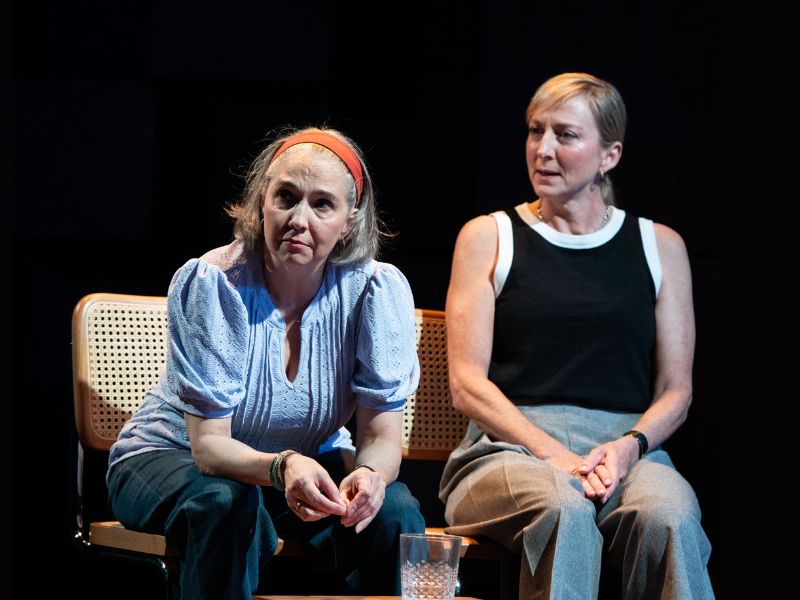“I hate the name Holly.” Delivered in deadpan by Kate Eastwood Norris in the opening moments of David Auburn’s Summer, 1976, the otherwise innocuous line elicits a disproportionately large laugh, like an inside joke. And it is, in a way, as prolific Washington actress Holly Twyford sits just a few feet away, utterly unfazed by the line or the laugh, and remains dutifully in character. So it goes for the duration of the play’s 90-minute run in Studio’s Milton Theatre, where the pervading sense is that one is settled among friends.
For this rich meditation on friendship (especially between women), Auburn has crafted a memory play of a most special sort. Made of equal parts chronicle and character study, it is an exploration not simply of who they were, but of who we are; not just of what they’d done, but of what we do. In the summer of 1976, single mother and artist Diana (Norris) meets Alice (Twyford), a faculty wife and free spirit, in the way that so many adults do: through their children. Separately, they defy their own stereotypes (Alice remarks on the surprising orderliness of Diana’s home and studio, Diana on the disconnect between Alice’s hippie values and conventional marriage). Together, they complement each other, establishing an easy confidence and caring for each other during a period that brings both physical and emotional struggle.

There is a palpable poignancy to Auburn’s selection of the summer of 1976 as his play’s primary setting. He peppers the text with plenty of pop culture references — Charlie’s Angels, James Clavell’s Shōgun, etc. — not as an exercise in nostalgia, but as an effort to ground the play (and he does). These little reminders go far in capturing what must have been the enduring spirit of that bicentennial year: talk of freedom and liberty three years after Roe v. Wade was handed down and a few more before the Equal Rights Amendment would fail to meet its ratification requirements. A hope lingers in the summer air amid the echoes of 1960s counterculture (costume designer Helen Q. Huang has Norris in culottes) and murmurs of second-wave feminism. The coming Reaganism and digitalization wait quietly in the wings.
Auburn writes as George Seurat painted, meticulously arranging dots to assemble a larger picture. But look closer and you’ll find deception in the details; green in the water, blue in the grass. In Summer, 1976, those errant dots manifest as unreliable narrators, competing stories, or little fibs about the particulars of a job or an affair. But memory isn’t always reliable, is it? And Auburn seems to know that sometimes little untruths can bring reality into a much sharper focus, and uses it to his advantage.
Director Vivienne Benesch is a perfect match, neither overwhelming the material with too-ambitious staging nor totally disappearing behind the layered text. With just a pair of cane-and-chrome chairs, two wooden cubes, and two mismatched drinking glasses, she vividly conjures a car, a café, an office, a kitchen, a backyard, and other distinct locales. Set designer Lee Savage’s contributions — a circular platform and rectangular backdrop — are made entirely of wood panels in various sizes, shapes, stains, and grains. Choosing wood, which is both enduring and ephemeral as the women’s friendship, lends a richness to the otherwise open space and provides a neutral canvas for projection designer Stefania Bulbarella’s Paul Klee–inspired abstractions that signal change in rich earth tones. Overhead, Jesse Belsky’s lighting seems to fade with the summer, except in a final sequence, when Diana and Alice are forced to confront the diminished state of their friendship under bright museum lights.

In that bright wash, it’s impossible to ignore the play’s central pleas: that without the investment of care and attention, we allow ourselves to cede the ground on which our most intimate relationships are built; that those to whom we once freely bared our souls can again become strangers in the span of a few months or minutes; that the briefest friendships can change the course of our lives. Because everyone has a friend, no one leaves the theater unscathed.
How fortunate, then, that audiences have two of Washington’s finest performers to lead the journey. Norris and Twyford embody Diana and Alice with an invigorating, infectious vivacity. Norris’ Diana is sardonic and hell-bent on concealing her insecurities. As Alice, Twyford latches onto pep and humor to obscure the signs of a failing marriage. They lean into their characters’ contradictions and dish effortlessly with each other and the audience. They establish trust almost immediately, which makes the little deceptions and missed connections all the more shattering. Their tandem performances are not to be missed.
If Summer, 1976 is a painful reminder of the fickleness of friendship, it is also a balm for the isolation that so often accompanies a changing season or seismic societal shift. While many more people will likely take in a separate story of unlikely friendship this month (featuring a green girl and a good witch), Summer, 1976 makes good on the same loving refrain: “Because I knew you I have been changed for good.”
Running Time: Approximately 90 minutes with no intermission.
Summer, 1976 plays through December 22, 2024, in the Milton Theatre at Studio Theatre, 1501 14th Street NW, Washington, DC. For tickets ($40–$95, with low-cost options and discounts available), go online or call the box office at 202-332-3300.
The program for Summer, 1976 is online here.
COVID Safety: Masks are recommended but not required. Studio Theatre’s complete Health and Safety protocols are here.
SEE ALSO:
Two DC legends to share stage in ‘Summer, 1976’ at Studio Theatre (news story, Ocober 25, 2024)
